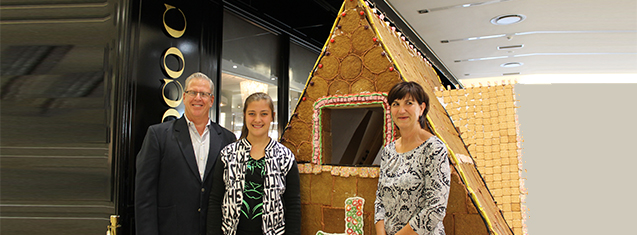
Professor André Venter, Head: Department of Paediatrics and Child Health, Morgan Pelser, and Tertia de Bruin, Project Coordinator: Children’s Wing: UFS Marketing.
Photo: Leonie Bolleurs.
“You have to dream before your dreams can come true.” These words rang true for Morgan Pelser from Bloemfontein when she fulfilled her wish on Tuesday 3 November 2015 at the launch of her ‘big and real’ Gingerbread house.
Pelser, 13, said she had the idea of building the gingerbread house over six months ago and began working tirelessly, raising funds for the project. She intends to donate the money raised from this initiative to the Children’s Wing Project at Pelonomi and Universitas Hospitals. It was back in Grade 4 when she had the opportunity to tour through the ICU, neonatal and paediatric wards of the two hospitals, that she saw the need for better equipment and facilities. Pelser hopes to raise R200 000 through the initiative.
Professor André Venter, Head: Department of Paediatrics and Child Health at the University of the Free State, said he was greatly humbled by the perseverance and passion shown by Morgan in executing her dream. “I work with children, so I know how resilient they are, but seeing this is amazing. We tend to give up so easily,” he said. He went on to say that the money will be greatly appreciated, as it will be used to provide health-care facilities for children at both hospitals.
The launch of the gingerbread house was a huge success. The house is currently outside Coco C at the Loch Logan Waterfront. Members of the public are encouraged to see and taste the giant house, where they can leave a message on the inside of the house. A minimum fee of R20 is requested.
Professor André Venter, Head: Department of Paediatrics and Child Health, Morgan Pelser, and Tertia de Bruin, Project Coordinator: Children’s Wing: UFS-Marketing.
Photo: Leonie Bolleurs.